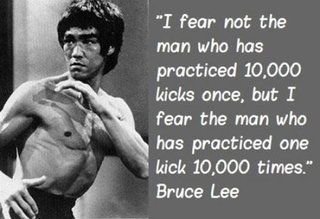- Joined
- Jun 20, 2011
- Messages
- 4,732
- Points
- 83
Hidden Insights From A Martial Arts Movie Star

You will never get any more out of life than you expect. — Bruce Lee
Although Bruce Lee is best known for his legendary legacy in martial arts and film, he was also one of the most underappreciated philosophers of the twentieth century, instrumental in introducing Eastern traditions to Western audiences.
A philosophy major in college, he fused ancient ideas with his own singular ethos informed by the intersection of physical and psychological discipline, the most famous manifestation of which is his water metaphor for resilience.
Early in his career, Lee was systematically sidelined by Hollywood’s studio system, which operated with extreme racial bias and still used white actors to portray stereotypical Asian characters. Over and over, Lee was told in no uncertain terms that white audiences simply wouldn’t accept an Asian man as a lead character in a movie.
Not Just Kung Fu
Even when he finally broke through and was cast as a lead, the studios continued to treat him as a brainless robot, there to entertain with his kung-fu skills.
When they tried to cut all the philosophy out of Enter the Dragon because they wanted a vacantly entertaining action movie, Lee refused to go on set for two weeks, insisting that the kung-fu and the philosophy were inextricably entwined, each the vehicle for the other.
Hollywood eventually had to relent and it was precisely the philosophical dimension that rendered the movie — just before the release of which Lee met his untimely death in 1973 — a cultural icon and a beacon of racial empowerment associated with the Black Power movement, later acquired by the Library of Congress as a “culturally, historically, or aesthetically significant” artifact.
Mind And Body Philosophy
Lee saw philosophy as inseparable from everyday life, just as he saw the mind as inseparable from the body, each end of the battery constantly charging the other. He recorded his rigorous workout routine alongside his philosophical meditations, which he fleshed out in the course of living.
Even his handwriting, meticulously neat and measured to fit the tiny page, radiates Lee's formidable discipline and orderliness.

Like Oliver Sacks, who carried a notebook everywhere, Lee always had a tiny 2×3″ pocketbook with him, which he filled with everything from training regimens to the phone numbers of his pupils (who included trainees like Chuck Norris and Steve McQueen), to poems, affirmations, and philosophical reflections. Even his handwriting, meticulously neat and measured to fit the tiny page, radiates Lee's formidable discipline and orderliness.

You will never get any more out of life than you expect. — Bruce Lee
Although Bruce Lee is best known for his legendary legacy in martial arts and film, he was also one of the most underappreciated philosophers of the twentieth century, instrumental in introducing Eastern traditions to Western audiences.
A philosophy major in college, he fused ancient ideas with his own singular ethos informed by the intersection of physical and psychological discipline, the most famous manifestation of which is his water metaphor for resilience.
Early in his career, Lee was systematically sidelined by Hollywood’s studio system, which operated with extreme racial bias and still used white actors to portray stereotypical Asian characters. Over and over, Lee was told in no uncertain terms that white audiences simply wouldn’t accept an Asian man as a lead character in a movie.
Not Just Kung Fu
Even when he finally broke through and was cast as a lead, the studios continued to treat him as a brainless robot, there to entertain with his kung-fu skills.
When they tried to cut all the philosophy out of Enter the Dragon because they wanted a vacantly entertaining action movie, Lee refused to go on set for two weeks, insisting that the kung-fu and the philosophy were inextricably entwined, each the vehicle for the other.
Hollywood eventually had to relent and it was precisely the philosophical dimension that rendered the movie — just before the release of which Lee met his untimely death in 1973 — a cultural icon and a beacon of racial empowerment associated with the Black Power movement, later acquired by the Library of Congress as a “culturally, historically, or aesthetically significant” artifact.
Mind And Body Philosophy
Lee saw philosophy as inseparable from everyday life, just as he saw the mind as inseparable from the body, each end of the battery constantly charging the other. He recorded his rigorous workout routine alongside his philosophical meditations, which he fleshed out in the course of living.
Even his handwriting, meticulously neat and measured to fit the tiny page, radiates Lee's formidable discipline and orderliness.

Like Oliver Sacks, who carried a notebook everywhere, Lee always had a tiny 2×3″ pocketbook with him, which he filled with everything from training regimens to the phone numbers of his pupils (who included trainees like Chuck Norris and Steve McQueen), to poems, affirmations, and philosophical reflections. Even his handwriting, meticulously neat and measured to fit the tiny page, radiates Lee's formidable discipline and orderliness.

